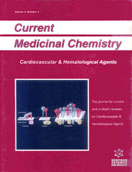Abstract
Thrombosis is the most important underlying mechanism of coronary heart disease and embolic stroke. Therefore, antithrombotic therapy is commonly used in cardiovascular diseases. Unfortunately, the benefits are limited, and an important proportion of treated patients will suffer a new thrombotic event. Lack of clinical benefits may be related to heterogeneous response to antithrombotic treatment among individuals (inter-individual heterogeneity). Few factors have been identified to be involved in this inter-individual heterogeneity. Recently, pharmacogenetic has emerged as a new field in medicine that tries to identify gene variants able to explain the heterogeneity in patients response to a drug. Polymorphisms affecting disposition, metabolism, transporters or targets of the drug could modify the individual response to one therapy, and probably its side effects. The present review article explores the genetic influence on antithrombotic drug efficacy, analysing the modulating role of different polymorphisms on individuals response to drugs commonly used in current day practice.
Keywords: pharmacogenetics, polymorphism, antithrombotic therapy
 2
2











